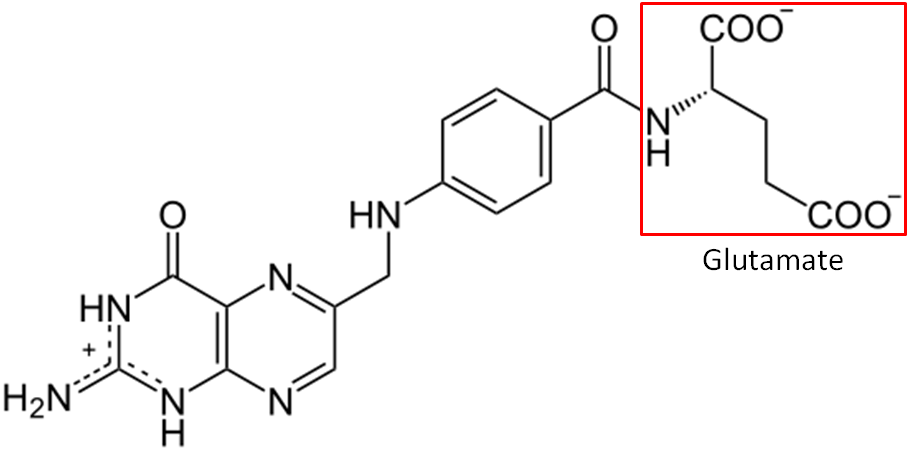Folate, a B vitamin, exists in two forms: the reduced form (folate) and the oxidized form (folic acid). When we refer to folate, that is generally speaking in regards to the naturally occuring form. Folic acid is a synthentic is present in select fortified foods due to enrichment, not its inherent production.
They also differ in the number glutamates in their molecular tails. In the structural representation of folic acid above, glutamate is highlighted.
- Folic acid consistently presents as a monoglutamate, signifying it contains only one glutamate unit.
- Conversely, approximately 90% of dietary folate exists as polyglutamates, indicating multiple glutamate units in their tails. Folic acid exhibits greater stability compared to folate, which can be susceptible to degradation from factors like heat, oxidation, and light.
Table: Comparison of Folate and Folic Acid
| Folate | Folic Acid | |
|---|---|---|
| Form | Reduced | Oxidized |
| Origin | Natural | Synthetic |
| Glutamate Units | Polyglutamate | Monoglutamate |
| Stability | Less stable | More stable |
Common Questions Regarding Vitamin B9
"Shouldn't everyone take folic acid supplements?"
If one is attempting to follow the Walsh Protocol for treating Overmethylation then the answer to this is "yes." It is generally good for overmethylators, because the these individuals are often low in folate. But persons who are Undermethylated, not based on a genetic tests but with from an assessment of historical information and labs testing. Methylation status is particularly important to know, expectially before taking folates and understanding that symptoms of depression or other mood disorders may actually worsen with folate supplementation. Key nutrients that become imbalanced can lead to high or low activity of neurotransmitters. For instance, high levels of copper will lead to elevated noradrenalin and lower levels of dopamine. Folates lead to lower serotonin and lower dopamine, making this a great supplement for Overmethylators. But folates for Undermethylators, will likely make their depression symptoms or other issues caused by low serotonin and low dopamine. There are many benefits and needs to have sufficient levels of folate on board. This can easily be confirmed with testing. But if consistently low in folates, supplementation will likely be rewarding.
"I am Homozygous for MTHF; Do I Need Folinic or Folic Acid Supplements? "
Folates comprise both natural and synthetic forms of vitamin B9.
- Folic Acid:
- Synthetic Form: Folic acid is the synthetic form of vitamin B9. It is commonly used in dietary supplements and fortified foods.
- Conversion Required: In your body, folic acid needs to undergo enzymatic conversion to become the active form of folate, known as 5-MTHF. This conversion may not be efficient for everyone, especially those with specific genetic variations.
- Bioavailability: Some individuals may find it challenging to convert folic acid effectively into the active form, making direct supplementation with 5-MTHF a preferred option for them.
- Folinic Acid:
- Intermediate Form: Folinic acid, also known as levomefolic acid or 5-formyltetrahydrofolate, is an active form of folate.
- Closer to Active Form: Folinic acid is one step closer to the biologically active form of folate (5-MTHF) than folic acid. It provides a readily available source of folate for metabolic processes.
- Usage: Folinic acid is utilized in medical treatments, such as cancer chemotherapy, to ensure a direct source of folate for specific biochemical pathways.
- Folate (Natural Form):
- Naturally Occurring: Folate is the form of vitamin B9 that naturally occurs in food.
- Derivatives: Folate comes in various derivatives like tetrahydrofolate (THF) and 5-methyltetrahydrofolate (5-MTHF). These derivatives are biologically active and play essential roles in processes such as DNA synthesis, amino acid metabolism, and cell division.
- Food Sources: Folate is abundant in certain foods, including leafy greens, legumes, and liver. A balanced diet can provide an adequate intake of natural folate.
- Methylfolate (5-MTHF):
- Active Form: Methylfolate is the biologically active form of folate. It doesn't require further conversion in the body and is readily available for use.
- Methyl Group: Methylfolate contains a methyl group (CH3) in its structure, which plays a crucial role in various biochemical reactions, including DNA methylation and neurotransmitter synthesis.
- Use in Supplementation: Methylfolate supplements are favored, especially by individuals who have difficulty converting folic acid to its active form due to genetic variations.
In summary, folates encompass various forms, both natural and synthetic. The choice of which form to consider may depend on individual factors, including genetic variations and specific health conditions.
Not every one who has a genetic SNP for MTHF, necessarily requires supplemenation with methylated or folinic acid supplements. While genetic SNPS are predicitive of possible outcomes, they are not absolute. The body often finds other mechanisms to address its needs. The simplest test would be to monitor CBC and homocysteine levels. Watch for megaloblastosis or homocysteinemia. If that's not occurring, there has not been a chronic deficiency of folates.

